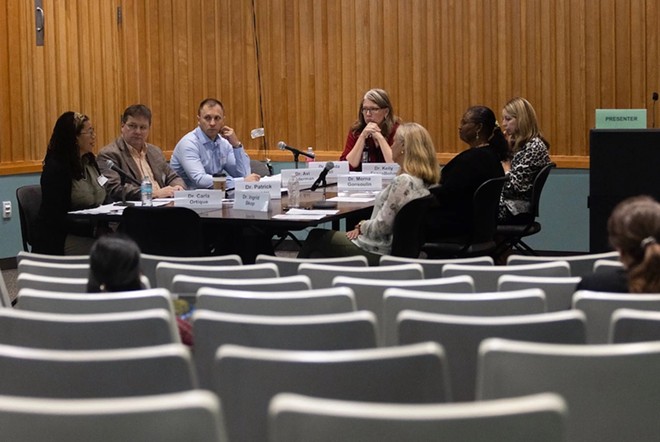
Texas Tribune / Loraine Williett
The Texas Maternal Mortality and Morbidity Assessment Committee met on Friday to debate the newest two-year maternal mortality report and to debate modifications, together with for the group to assessment abortion-related deaths.
Join The Temporary, The Texas Tribune’s every day publication that retains readers on top of things on essentially the most important Texas information.
Texas’ maternal mortality committee ought to be allowed to assessment abortion-related deaths and have extra voices from impacted communities on the desk, the group’s chair mentioned at a Friday assembly.
These feedback symbolize the committee’s most forceful critique but of the system by which the state opinions deaths associated to being pregnant and childbirth.
Dr. Carla Ortique, a Houston OB/GYN who chairs the committee, known as for the reversal of latest legislative modifications that redrew committee membership and commenced the method to take away Texas from the federal maternal mortality monitoring system. She mentioned the Legislature ought to take into account lifting the redaction necessities that maintain these deaths nameless and permit the committee to assessment deaths associated to abortion, which they discovered in March had been excluded from their information for greater than a decade.
“Every maternal dying, every life that’s misplaced, has worth,” she mentioned. “We won’t make feedback about what brought on a rise in maternal dying in our state if we’re probably not reviewing all of them.”
These requires reform come amid a latest report exhibiting a major spike in maternal deaths in 2020 and 2021, reversing a number of years of enhancements. The information from this report paperwork the interval earlier than the state banned almost all abortions, which is anticipated to extend maternal mortality.
This month, ProPublica reported on two Georgia ladies who died after they couldn’t entry authorized abortions and well timed medical care due to the state’s abortion restrictions. Georgia’s maternal mortality committee deemed these deaths to be preventable, public information present.
Dr. Ghazaleh Moayedi, a Dallas OB-GYN, abortion supplier and chair of Physicians for Reproductive Well being, informed The Texas Tribune she is definite there are related tales in Texas, a state 3 times as giant as Georgia with even stricter abortion legal guidelines.
“The framing round these being the primary recorded deaths is deeply painful, as a result of I do know there are folks that have died proper right here, however their tales are by no means going to be informed in that approach,” she mentioned.
The Texas Legislature, which reconvenes in January, must change the legislation to permit the committee to assessment abortion-related deaths.
Disparities persist
In 2020, as a pandemic raged in hospitals and houses, 85 Texas ladies died from problems associated to being pregnant and childbirth, discovered the committee’s newest report, which is launched each two years. Whereas the quantity pales compared to the devastation of COVID, these deaths symbolize one other public well being disaster — that of avoidable maternal mortality, particularly in Black communities.
Greater than a decade in the past, Texas started a bipartisan push to enhance well being outcomes for pregnant ladies. The Legislature created a maternal mortality assessment committee. State businesses, hospitals and advocacy teams started working collectively on focused enhancements for persistent challenges like obstetric hemorrhage and substance abuse points.
This effort has yielded outcomes — for some. Being pregnant-related mortality charges amongst white ladies decreased from 20.3 deaths per 100,000 stay births in 2013 to 16.1 in 2020.
For everybody else, maternal dying charges have elevated in the previous few years. Whereas Hispanic ladies usually have decrease charges of maternal mortality than their friends, the numbers have elevated steadily since 2013 to a excessive of 14.2, excluding COVID-19 deaths.
And Black ladies stay 2.5 instances extra prone to die from being pregnant and childbirth than white ladies. For each 100,000 stay births, 39 Black ladies die.
There’s no genetic motive Black ladies ought to be dying at increased charges than their friends, mentioned Dr. Amita Vyas, the director for Maternal and Little one Well being on the Milken College of Public Well being at The George Washington College. Fairly, she mentioned, these statistics are reflective of a medical system that’s weighted towards Black moms.
“Systemic racism that notably Black ladies have skilled in being pregnant and childbirth is among the most important drivers of maternal deaths throughout the nation,” Vyas mentioned.
Texans, as a complete, face a number of challenges that result in maternal mortality, from lack of entry to contraception and intercourse schooling and rising maternity care deserts, to delayed prenatal care, rising charges of persistent situations, lack of insurance coverage and poverty.
There are methods to enhance these limitations to wholesome pregnancies, however researchers have but to critically analyze why they aren’t working in communities of shade, particularly Black communities, Moayedi mentioned.
“We are able to’t simply say, ‘Oh, the OB-GYN was racist,’” she mentioned. “I want it had been so simple as that … What I am speaking about is systemic institutional racism, the ways in which we arrange our well being care techniques from prime to backside which can be truly designed to perpetuate racial harms.”
Confirmed options to enhance maternal well being outcomes in Black communities embody rising entry to doulas, midwives and birthing attendants, coaching well being care suppliers in culturally delicate care, and enhancing prenatal and preconception care fashions. Final legislative session, Texas took the long-awaited step of extending Medicaid protection for one yr postpartum, slightly than the 2 months beforehand supplied.
These are welcome modifications, Moayedi mentioned. However in a state that’s at the moment proscribing even conversations about variety, fairness and inclusion, she feels these are band support options on a a lot deeper wound.
“Racism is just not essentially a person ethical failure, however it’s throughout the material of our nation,” she mentioned. “It’s all of our work and obligation, particularly as well being care suppliers, to teach ourselves on this, to grasp the way it reveals up inside our techniques, and to actively work to dismantle these techniques that undo any good work that we are able to probably do.”
Committee modifications
The assessment committee, in its report, advisable the state “interact Black communities” within the work of enhancing these disparities. However when the group met Friday, one voice was notably absent.
Nakeenya Wilson, a Black lady who skilled a traumatic beginning, beforehand served on the committee in the neighborhood advocate position and helped assessment all the deaths that had been specified by the newest report. However after the Legislature redrew the make-up of the committee in 2023, she was eliminated.
“I gave three years of my life, among the most tough years of everybody’s lives, in the midst of a pandemic, with two young children … to make sure folks like me don’t die,” Wilson informed the Tribune forward of Friday’s assembly. “And the state made a option to take away my voice and my capacity to talk for many who don’t have a voice.”
Wilson’s position was changed by two group member positions, one for an city consultant and one for a rural consultant. Wilson re-applied for the city place, however a Houston pediatric emergency medication fellow was appointed as an alternative. The agricultural place was awarded to Dr. Ingrid Skop, an OB/GYN from San Antonio, the state’s second largest metropolis, as an alternative of a labor and supply nurse from the Rio Grande Valley.
In a press release on the time, Skop mentioned she had “usually cared for ladies touring lengthy distances from rural Texas maternity deserts, together with ladies struggling problems from abortions.”
In her position as vice chairman and medical director of the Charlotte Lozier Institute, an anti-abortion assume tank, Skop has testified earlier than Congress and state legislatures, in addition to in courtroom circumstances, in favor of abortion restrictions.
In September 2023, Skop wrote an article claiming that maternal mortality may very well enhance in states that ban abortion as a result of fewer ladies could have psychological well being points associated to regretting an abortion and having a baby could cut back a girl’s likelihood of later getting breast most cancers.
On the assembly Friday, Ortique mentioned she hoped lawmakers would take into account restoring among the group voices to the committee.
“There’s worth in having that voice on the desk,” she mentioned, including, “it is one thing that has been acknowledged on the nationwide stage that it brings higher depth, higher breadth, higher alternatives for wealthy and actionable suggestions.”
Abortion impacts
The maternal mortality committee’s subsequent report, which is launched each two years, will take a look at deaths from 2021, after which “leapfrog” forward to deaths from 2024, Ortique mentioned on the assembly Friday. The committee is hopeful that reviewing newer deaths will permit for extra well timed suggestions to the Legislature in 2027.
Reviewing deaths from 2024 will cowl a interval throughout which abortion was banned in Texas. However with out the power to assessment abortion-related deaths, it will likely be onerous for the committee to find out the impression of those legal guidelines on maternal well being outcomes.
Whereas authorized abortion is safer than childbirth, the chance of problems will increase when folks search abortions outdoors of the same old well being care system.
“Should you’re in a state the place abortion is restricted, you are going to have an elevated variety of pregnancies that ladies are compelled to hold to time period,” mentioned Vyas. “Simply by sheer variety of extra pregnancies, we will have extra maternal deaths. That’s the only piece of it.”
Vyas applauded Georgia’s maternal mortality committee for reviewing and making out there details about abortion-related deaths. Earlier this month, ProPublica reported on the dying of Amber Thurman, a 28-year-old nursing assistant and mom, who died after docs delayed performing a standard process to take away fetal tissue that hadn’t correctly handed after a drugs abortion.
Additionally they reported on Candi Miller, a 41-year-old mom of three with lupus, diabetes and hypertension, who feared that one other being pregnant may kill her. She ordered abortion-inducing remedy on-line however after a uncommon complication, didn’t expel the fetus totally. Frightened of searching for care due to the state’s abortion bans, Miller stayed at house, battling an infection by herself till she died together with her 3-year-old by her facet.
Georgia’s maternal mortality assessment committee deemed each deaths preventable. Final week, Skop wrote a weblog publish through which she agreed that these deaths had been preventable and the ladies “deserve justice.”
“However it’s previous time to cease the misinformation,” she mentioned. “We should place the blame the place it belongs – not on pro-life legal guidelines that shield each mom and baby, however on abortions supposed to finish the lives of three unborn kids that ended up taking the lives of their moms, too.”
This text initially appeared within the Texas Tribune.
The Texas Tribune is a member-supported, nonpartisan newsroom informing and interesting Texans on state politics and coverage. Study extra at texastribune.org.
Subscribe to SA Present newsletters
Comply with us: Apple Information | Google Information | NewsBreak | Reddit | Instagram | Fb | Twitter| Or join our RSS Feed





